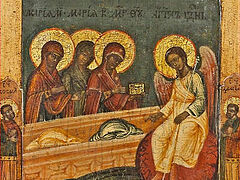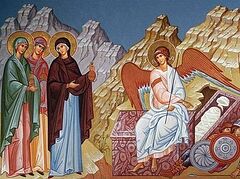St. John Chrysostom begins one homily like this: “The best way to honor the saints is to imitate their virtues.” This is similar to the teaching of the Apostle: Remember, writes St. Paul in his Epistle to the Hebrews, remember them which have the rule over you, who have spoken unto you the word of God: whose faith follow, considering the end of their conversation (Heb. 13:7).
This duty of ours is evident from the fact that God Himself doesn’t hear the prayers of unrepentant sinners and rejects their sacrifices as an abomination, as Solomon says in Proverbs: The sacrifice of the wicked is abomination: how much more, when he bringeth it with a wicked mind? (Prov. 21:27). Similarly, the Prophet Isaiah says: But the transgressor that sacrifices a calf to Me, is as he that kills a dog as a sacrifice; and he that offers fine flour, as one that offers swine’s blood; he that gives frankincense for a memorial, is as a blasphemer (Is. 66:3).
Conversely, the prayers of virtuous people and praise for His saints are pleasing to God: The eyes of the LORD are upon the righteous, says David, and His ears are open unto their cry… The righteous cry, and the LORD heareth, and delivereth them out of all their troubles (Ps. 33:16, 18). And that’s why, because they shone with virtues as lights in the world, the Apostle Paul called the Philippians my joy and my crown (Phil. 2:15, 4:1).
True Christian believers! Desiring to honor the holy Myrrh-bearers this day, we must also imitate their virtues, which I will propose to you in this word.
These holy women, firstly, having left their homes and possessions, clung to Christ, Who began His preaching in Galilee, and followed Him as He went about various cities and villages, as the Evangelists testify: And many women were there beholding afar off, which followed Jesus from Galilee, ministering unto Him: Among which was Mary Magdalene, and Mary the mother of James and Joses, and the mother of Zebedees children (Mt. 27:55, 56).
When these women followed Christ, He wasn’t yet glorified. His teaching about salvific sufferings, about His Resurrection from the dead, about His Ascension into Heaven and the future Second Coming to earth was, I say, either not yet revealed, or revealed only a little: But many didn’t want to believe. These women, however, even at that time firmly believed that Christ is the Son of God, and not wanting to be separated from Him, said together with the Apostle Peter, if not with their mouths then with their hearts: Lord, to whom shall we go? Thou hast the words of eternal life. And we believe and are sure that Thou art that Christ, the Son of the living God (Jn. 6:68-69).
Now Christ is glorified throughout the entire world. We celebrate His Resurrection and victory over death and hell, awaiting a similar resurrection for our bodies. We’re comforted by His Ascension into Heaven and His most glorious session at the right hand of His majesty in Heaven, because God, Who is rich in mercy, for His great love wherewith He loved us, Even when we were dead in sins, hath quickened us together with Christ, (by grace ye are saved;) And hath raised us up together, and made us sit together in Heavenly places in Christ Jesus (Eph. 2:4-6). We await His Second Coming. And how many times does He tell us: Surely I come quickly.
We answer Him not as worthless slaves, but as a bride joyously awaiting her bridegroom: Even so, come, Lord Jesus (Rev. 22:20)! And why shouldn’t we cling to the already glorified Jesus Christ, our Savior? Why shouldn’t we follow Him, following the example of the Holy Myrrh-bearers, abandoning all impiety and worldly lust? And for this, we don’t need to leave our homes, to leave our families and friends: We can follow Him wholeheartedly if only we walk the path of His holy commandments.
The second virtue of these holy women is that, following Christ, they served Him by offering their possessions, as the Evangelist Luke says: And Jesus went throughout every city and village, preaching and shewing the glad tidings of the Kingdom of God: and the twelve were with Him, And certain women, which had been healed of evil spirits and infirmities, Mary called Magdalene, out of whom went seven devils, And Joanna the wife of Chuza Herod’s steward, and Susanna, and many others, which ministered unto Him of their substance (Lk. 8:1-3).
And this virtue of the Myrrh-bearers can be easily imitated by all those whom God has endowed with property. For although we don’t see Christ walking in the flesh now, His brethren are as many among us as the poor, as those dying of hunger, as those shivering from the frost, as those sick but not visited, as those suffering in prison without supplies. They are so close to Him, brethren in Christ, that at the universal Judgment He will put Himself in their place, and everything that was done or not done to them, He will impute to Himself; and He will say to the benefactors of the poor: Inasmuch as ye have done it unto one of the least of these My brethren, ye have done it unto Me (Mt. 25:40).
He also says to the merciless souls: Inasmuch as ye did it not to one of the least of these, ye did it not to Me (Mt. 25:45). Here, I ask you with amazement, rich Christians—rich in yourselves and not in God—what do you hope for? So many times you see Christ appearing before you, reaching out His hand, entreating your help with a weak, exhausted voice, or a sickly cry: With all this, you despise and abhor your poor brethren, and the brethren of Christ, or even more so Christ Himself, neither fearing His judgment nor trembling at His severe torments! Where will your riches be then? And will they speak for you when, deprived of all your friends acquired here from the mammon of unrighteousness (Lk. 16:9), you will be sent to eternal torment?
The third virtue of the Myrrh-bearers is that they didn’t abandon Christ when He was taken to be tormented. All the Apostles fled (Mk. 14:50). Peter denied Him thrice (Lk. 22:61). A young man who followed Him was grabbed by the soldiers and left his robe and fled naked (Mk. 14:51ff.). But the Myrrh-bearers, following after Him as He was led through the court of the High Priest and the Praetorium, weren’t afraid to go with Him, and weren’t even ashamed to stand at His Cross: Now there stood by the cross of Jesus His Mother, and His Mother’s sister, Mary the wife of Cleophas, and Mary Magdalene (Jn. 19:25).
Joseph and Nicodemus, having placed the body of Jesus in a new tomb, and having rolled a huge stone against the door, both departed, but Mary Magdalene and the other Mary remained, as the Evangelist narrates, sitting across from the tomb (Mt. 27:61); and though the Sabbath kept them from anointing the body of Christ with myrrh, as soon as it passed, having prepared myrrh and spices and having diluted them with plenty of tears, they made haste to pay Him the last debt of zeal, fearing neither the darkness of night nor the guards at the tomb (Lk. 24:1).
By this virtue the women surpassed the men: The men fled, but the women remained with Christ. The men hid themselves for fear of the Jews, but neither the darkness of night nor the soldiers guarding the tomb could keep the women away. The preeminent Peter and John, the Beloved Disciple, having examined the empty tomb and the shroud left behind, went away again unto their own home (Jn. 20:10). But Mary Magdalene remained at the tomb, washing it with tears, until, having been called by a familiar voice by name, she fell at the feet of her most beloved Teacher (Jn. 20:16-17).
Who among us here is able to imitate such a virtue of the Myrrh-bearers? Who among us, in times of adversity and oppression, stands firmly with Christ, deviating not even an inch from His holy law? Who among us mourns, not for Christ—for the glorious state of the Risen One requires no tears from us—but for our sins, which forced Christ to suffer and die, and which crucify Him a second time? Who understands that instead of myrrh, we ought to prepare for God the most fragrant of virtues, and with these spiritual spices anoint not Jesus, Who is already resurrected, but our souls, mortified by sins, so that emitting no more stench, they might rise and be glorified with Christ?
Then we read in the Gospel that the Myrrh-bearers, having seen the Risen Christ, so rejoiced that they worshiped Him and held Him by the feet (Mt. 28:9). As for the Apostles, some of them worshiped the Risen One, while others doubted (Mt. 28:17). Thomas exclaimed: Except I shall see in His hands the print of the nails, and put my finger into the print of the nails, and thrust my hand into His side, I will not believe (Jn. 20:25). Cleopas said to his companion: But we trusted that it had been He which should have redeemed Israel (Lk. 24:21)—“we trusted,” as if to say: “We were deceived in our hope.” But the Myrrh-bearers cling to the feet of Christ with both hands, not wanting to let go until He reassured them that they would see Him again: I am not yet ascended to My Father (Jn. 20:17).
Oh! If only we would cling with all our heart and soul to Christ Who died for us and rose again for our salvation, thus imitating the Myrrh-bearers! He often appears to our souls; He knocks at the doors of our hearts, and may we open to Him and receive Him as a companion, with His Father and the Holy Spirit; He breathes His grace into us that we might love Him and keep His holy commandments. But, at the door of our hearts, there sits an even larger stone than that which was at His tomb.
Finally, the fifth virtue of the Myrrh-bearers is that, having despised the fear and weakness of their sex, they became the first preachers of the Resurrection of Christ, and they proclaimed it not just to the Apostles, but to the whole world: For after His Ascension, they passed through different countries and distant lands, proclaiming the Gospel, just like the Apostles; and some of them sealed their evangelism with blood.
And it should even be practical for us to imitate this virtue of the Myrrh-bearers. It’s not necessary to go about the whole world: We have at home, before our very eyes, those who need the Gospel. We have many Jews; there are not a few apostates from the faith, and there are even more lawless unrepentant people: They all need the Gospel—but how should we go about it? Are you thinking of getting into a war of words with them? We mustn’t, for they are skilled in this themselves. By our good works we proclaim to them the Gospel and our true faith: Let your light so shine before men, Christ says, that they may see your good works, and glorify your Father Which is in Heaven (Mt. 5:16). And the Apostle Peter says: Having your conversation honest among the Gentiles: that, whereas they speak against you as evildoers, they may by your good works, which they shall behold, glorify God in the day of visitation (1 Pt. 2:12). And to wives: Be in subjection, he says, to your own husbands; that, if any obey not the word, they also may without the word be won by the conversation of the wives; While they behold your chaste conversation coupled with fear (1 Pt. 3:1-2).
Let us imitate the Holy Myrrh-bearers, O right-believing Christian congregation! Both male and female, let us all embody their virtues in ourselves. Let us follow Christ on the path laid out for us by His commandment; with the possessions given us by God, let us serve His brethren like Him Himself; let us not depart from Him and His holy commandments, whether amidst misfortunes or sufferings; let us weep for our sins, which killed Him, and let us offer Him the fragrant myrrh of good deeds at all times; and finally, let us glorify Him before the unbelievers and the ungodly with the holiness and purity of our lives.
When He appears, no longer from the tomb, but from Heaven, coming in the clouds of heaven with power and great glory (Mt. 24:30), and meets us, and we Him, then we shall be caught up … in the clouds, to meet the Lord in the air (1 Thess. 4:17); then His coming will bring fear and trembling to some, and weeping and sobbing to others—then shall all the tribes of the earth mourn (Mt. 24:30). And to us, as Myrrh-bearers, He lovingly says: Rejoice! Enter thou into the joy of thy Lord (Mt. 25:21).
Amen!
Delivered on April 30, 1788, in the Descent of the Holy Spirit Monastery in Buynichi, in modern-day Belarus.





